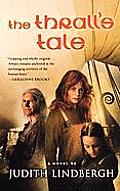 The Thrall's Tale is a masterpiece of historical fiction that follows Katla, a slave, her daughter Bibrau, and their mistress Thorbjorg, a prophetess of the Norse god Odin, as they navigate the stormy waters of love, revenge, faith, and deception in the Viking Age settlements of tenth–century Greenland. Lindbergh's lyrical prose captures the tenuousness of lives led on the edge of the known world, the pain of loyalties shattered by Christian conversion, and the deepest desires hidden in the human heart. A book that has appeal for readers of fantasy and romance as well as historical and literary fiction, The Thrall's Tale is an absorbing cultural saga researched and written over ten years as Lindbergh immersed herself in the literature, artifacts, and landscape of her characters' lives and world. (back cover text)
The Thrall's Tale is a masterpiece of historical fiction that follows Katla, a slave, her daughter Bibrau, and their mistress Thorbjorg, a prophetess of the Norse god Odin, as they navigate the stormy waters of love, revenge, faith, and deception in the Viking Age settlements of tenth–century Greenland. Lindbergh's lyrical prose captures the tenuousness of lives led on the edge of the known world, the pain of loyalties shattered by Christian conversion, and the deepest desires hidden in the human heart. A book that has appeal for readers of fantasy and romance as well as historical and literary fiction, The Thrall's Tale is an absorbing cultural saga researched and written over ten years as Lindbergh immersed herself in the literature, artifacts, and landscape of her characters' lives and world. (back cover text)
I first discovered The Thrall's Tale in 2007 (see post). I've had a copy sitting on my shelf for four years now. I loaned it to my mom (who loves historical fiction) shortly after I received it, but since then it's been more or less collecting dust. I know I've picked it up a few times during the past four years and I may have started it once, but I never dug into it until this month.
I'll admit it now. I didn't finish The Thrall's Tale. I really did make an effort, though: the novel is 446 pages long and I gave up on page 188.1
I really wanted to like The Thrall's Tale. It's a debut historical novel set during a time period with which I'm not familiar and it got great reviews.2 It seemed like the recipe for a great read, but unfortunately The Thrall's Tale did not work for me. The novel seemed to have much promise in its early pages, but the more I read of The Thrall's Tale, the less I wanted to continue reading it. Especially since, after a certain point, it seemed like there was no point in holding out for the promised romance as it was either going to come to absolutely nothing or be disappointing for all involved.
The Thrall's Tale begins with one female narrator (Katla, a teenage slave, accompanying her master from Iceland to Greenland), gains a second (Thorjorg, a seeress of Odin) and then a third (Bibrau, Katla's unplanned and unwanted daughter). I don't mind a multiple narrative structure (whether it be first- or second-person), but I don't think I've ever before read a multi-narrative book where I didn't enjoy any of the narrative threads.
- I liked Katla well enough in the beginning of the novel, but the drastic change in her personality after the incident that occurs around page 55 rendered her completely unsympathetic to me (I don't fault her for her reaction to the traumatic incident, but I found relating to her very difficult after that point).
- Thorjorg's narrative was tough from her entrance because of her obtuse, oracular voice. Even early on (when I was still genuinely interested in following the story), I found myself skimming through her chapters.
- Finally, there's Bibrau. She comes across as more than just strange. She's like an evil child in a horror movie. I didn't want to know more about what would happen to her or what she would do because it seemed like it was only going to get worse.
BUT, The Thrall's Tale has gotten good reviews so your mileage may vary, as they say.
- That's about 42% of the way through.
- From Library Journal, Geraldine Brooks, and Jonis Agee just to name a few.

hmm, it sounds interesting and seems like it would be up my alley. Maybe I will give it a shot and see if it clicks better than it did with you. Oh well, thats why there is such a wide variety of books, not every book can be for every one!
ReplyDeleteOh, this is one of the rare books that I liked so much, I bought a copy for myself after reading it. I tend to like stories of women in positions of power where you wouldn't expect it, and loved the barren, unforgiving landscape. I keep looking for more by the author, and I hope she's spending another 10 years on an interesting research project.
ReplyDeleteIt really is a question of taste! I'm happy to hear that you loved the novel, Jenny, and that you want to read it, Ang.
ReplyDelete